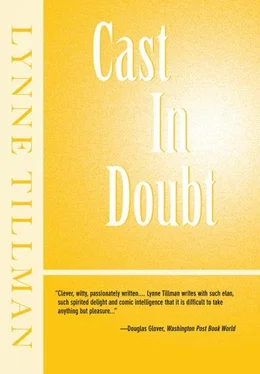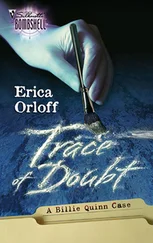Now I am sure they haven’t slept together but that Alicia lusts for him just a little, or maybe a great deal, perhaps in a Death in Venice way, which I too could easily fall prey to. This thought invades me, nearly an epiphany of the negative. It feels unpleasantly real, and might be ineluctable. That is, once I have placed all of us in this narrative, I might just be determined to see it through. I am a perverse creature. But, I remind myself, I don’t need John, as I have Yannis. But he doesn’t and cannot negate John. Fantasy is fantasy, literature is literature, destiny is destiny. And I, I live life for art’s sake.
Overwhelmed almost by the sight of John now, having articulated this desire so brazenly to myself, my secret self, I tell them I must return to Gwen, who will probably be awake and hungry. John will come to my rooms tomorrow, he says, to see if he can do the work, man, as he refers to me. Man, I think to myself, yes, that is surely what I am. I rush to the door, as if to escape fate.
But the die is cast. I walk into the hallway, followed by Alicia; she is close beside me. I exclaim, Oh Alicia, the books. Which books? she asks. Yours. On Gypsies, may I borrow them? Of course, but I didn’t think you had any interest in Gypsies, dear. I do of late, I say, abashed. Yes, she answers, of late many things are different. Alicia takes my hand. Helen no longer comes for her piano lessons, she adds almost ruefully. Have you seen her? she asks. No, I haven’t. I think she is angry with me. You see, Horace, I was right to distrust her. Alicia, you distrust everyone. I was nasty to her. You were probably drunk, Horace, I worry so about you. Pish-posh, I sputter, I’m made of sterner stuff than you think.
Standing there, holding Alicia’s soft hand, I think, rather suddenly, I’ll have a party. And instantly blurt out, Alicia, come for a party the end of next week — won’t you? And John. For Gwen. I’ll invite the whole crowd, Helen too. What do you think? Alicia responds thoughtfully, What I think is, I hope you know what you’re doing. She kisses me on the cheek. I look toward the living room and admonish waggishly, I hope you know what you’re doing, too.
Alicia glides to the bookcase and gathers several books from the shelves. She hands them to me and looks steadily into my eyes, as if to unfrock me, then answers, much too wisely, I know as much as you do, dear. Alicia always has to have the last word.
Yannis enters my room, agitated. His disturbance has something to do with Roger and the blond boy who was with him nights ago. Yannis is so angry I can’t apprehend what occurred. Sigá, sigá , I say, to quiet him. Just tell me, slowly, what happened. Yannis reports that he was fishing with the blond boy, the friend of Roger, as he puts it. Roger came upon them and accused Yannis of stealing his fountain pen — a beloved object inherited from his father — and perhaps some money, too. Yannis became, and is still, infuriated by Roger’s attack upon his character. Rightly so. Roger must have been drunk, I explain to Yannis, he could not have been in his right mind. I make circles with my index finger, next to my temple, to emphasize Roger’s alleged craziness. I will write him, I continue in a consoling tone.
Right then and there I take out my best-weight letter paper and begin the salutation. I intend to handle this unappealing matter directly and with speed, but I will also invite Roger to the party for Gwen. Two birds with one stone; one bird to take the sting out of the other, for it is possible that this mild rebuke may be unnecessary. Yannis may be concocting the story, or something else may have transpired, which he has been canny enough to cover up through the invention of this tale. I look at Yannis, who seems earnestly angry. I don’t want an all-out war with Roger; our nightly sniping is mission enough.
The door opens. Gwen has emerged from her beauty sleep. Naturally Yannis is not delighted to see her, being in a sullen mood. I too am a trifle agitated. I hate these kinds of bizarre disturbances. Also, I am anxious that what occurred among Roger, the blond boy, and Yannis may be revealed to be of a sinister nature, much darker and more convoluted than what I’ve heard, though for Yannis to be accused of theft is dark enough, for him. Still, my guess is that a piece is missing from this puzzle.
With Gwen present I don’t want Yannis and my unpleasant conversation to proceed. I place the letter paper under the blotter. Yannis stands by my side, still looking over my shoulder, though I have stopped writing. I halted mid-sentence — didn’t René Daumal die mid-sentence when writing Mount Analogue ? Standing thus, Yannis surely is an ominous figure, or at least an unfriendly one, to Gwen. Though Gwen must be accustomed to surly and unruly types — bouncers, rock-and-roll musicians, scenemakers and the like. They probably do not disturb her, whether or not they offend her. Incivility is unnecessary. People ought to behave, to attempt first to be polite, to respect each other, simply to make the world a less disgusting place to exist in — for oneself if nothing else. Otherwise we are mangy dogs.
After a definitive gesture — I cross my hands over each other several times — I stand and look directly into Yannis’ dark, angry eyes. When he seems as if he is not going to give ground or relent, I brush past him, insisting, in an aside, Telos, telos, endáksi , okay? He turns abruptly and stares at Gwen, glowers at her I think, then retreats into his room. I’ll deal with him later.
Telos , she repeats. Quel droll. To know the end now, Lulu. Wouldn’t that be marvelous? The puffiness and dark circles beneath her eyes cast her as the sophisticate, a moody one at that. She could never play the naive ingénue. They never go, she says, touching the soft skin beneath her eyes, the area she designates as her pillows of tormented pillow talk. I brew some coffee; she stretches out on the chaise longue and lights a cigarette. She is about to spin a tale for me, I can tell, and I get as comfortable as I can, hoping that my bones won’t ache from sitting and that my fingers won’t go numb. I treasure Gwen’s stories.
In New York, Gwen was caught between two friends who had become lovers and who were fighting like mad and drawing her into the fray. Daily telephone calls lasted for hours, first one of the furious lovers, then the other, to tell his or her side of it, the recent split-up, and there were threats of suicide as well as indiscriminate pill-taking by both parties. Mandrax was the drug of choice; an orgy drug, for some, she adds, waiting for me to react. I don’t. Gwen was not beyond reproach from either of the lovers, since when they made up, which was as often as they split up and as impermanent, both would vent their fury upon her. Why had she said this to that one and so on. Comical and boring, a miserable situation. One of the pair had slept with the enemy of the other, and the question was: Was her sleeping with him a deliberate attack on the other’s career? Quel drag, Gwen intones.
Then there were her own intimate relationships. She was still seeing the Hunk — Gwen has a nickname for everyone — the married man. It was abundantly clear he wouldn’t leave his wife, and it was also clear that Gwen’s remaining close to her friend, his wife, was entirely untenable. Untenable for ten years, I remark, not without some acerbity. She ignores me as only she can.
The New York scene was appalling. Tacky. The boys were becoming younger, and she’d slept with two girls, both of whom became serious about her, the older woman, much to her chagrin. Life was dreary. The seventies were boring to her, in one way, and outrageous in another, and they were half over. This too was depressing. She was unable to get into punk. She was tired of the clubs, none was what it used to be. I’m not what I used to be, she says. She feels old, but can’t stop herself from devouring whatever’s around, tawdry remakes of the un-original. Rebellion had reached new lows. A teenybopper punkette spat on Gwen’s neck at a club called CBGB’s. She wasn’t sure at first what it was — perhaps a leaky roof. She looked up but saw nothing. It happened again. Finally Gwen turned around in her seat to find the idiot child smiling at her as if she’d given Gwen a gift. Gwen was too drunk to respond. Small indignities reminded her that the times were truly silly. Quel zeitgeist.
Читать дальше












